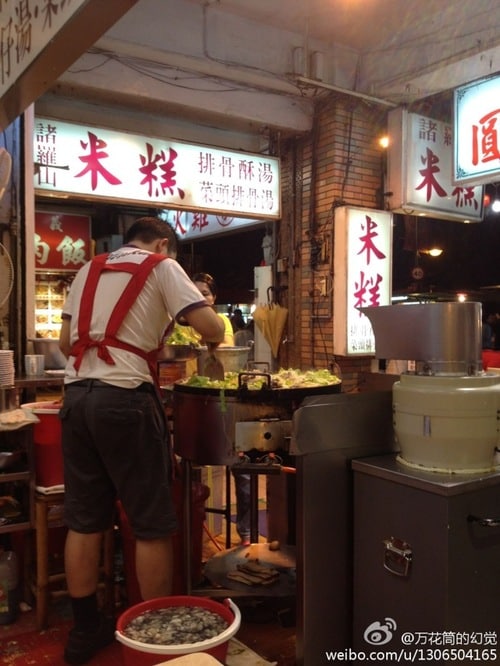Last week, I made my second trip to Taiwan. Being a non-Chinese who has learned all his Chinese from mainlanders and spent 2 years on the mainland, Taiwan was always something of a mystery to me. When I met non-Chinese who have spent time in Taiwan, they would always rave about its awesomeness. The food, the people, the culture. I could never get it. 6,000 years of shared history––it can’t be that different, right?
After visiting Taiwan, I found a lot of on-the-ground differences in the way people think about the world and interact with others. The most delicious of these has to do with street food.
The picture above shows the back of a man making oyster pancakes (煎蚝饼) at Ning Xia Night Market (宁夏夜市), a Taiwanese street food delicacy. This particular oyster pancake joint was packed and one had to wait in line. I took an interest in the chef. He never looked up. He didn’t seem to know he was surrounded by about 30 people watching him. I don’t think he even realized he was at work. His hands moved and poured and flipped and plucked with deft precision, as if he was an artist sculpting his next masterpiece. He was engrossed in perfecting his product.
More importantly, at the bottom of the picture is a giant bucket filled to the brim with raw oysters. Filled to the brim with raw oysters. Can you even imagine that? Mischievous teenage Daniel could have really went to town if Seneca High School had only equipped their students with such buckets. Bullies and cruel Social Studies teachers beware.
Anyway, he was not the only street vendor who seemed to care about his or her product. Everywhere I went, it seemed an large proportion of street vendors actually enjoyed making and selling their foods. Many vendors each had something unique about their stall, separating them from all the others in either product or decor.
On the other hand, in the mainland I have never met a street vendor who appears to love his or her product. To the street vendors I encounter, their food is a job. It’s a living, not a passion. Just down the street, there are probably 10 more vendors offering the exact same product at the exact same price. Every night market or row of street vendors I’ve encountered are some mix of the same 3-5 stalls repeated ad infinitum.
I suppose this vague standardization has some good qualities to it. If I get off at any subway stop in Beijing and am craving a 煎饼 (Fried Pancake), I can probably find one of regular quality and price less than a block from the subway exit. Also, with such a high level of commoditization, prices are very low.
But it’s boring. Shouldn’t all people have a willingness to be different and unique? To love what they do?
So, why the difference? Maybe it’s politics. Maybe it’s social norms. I’ve even heard that the food in Taiwan is better because the KMT took all the best chefs. Unfortunately, I don’t think it’s so simple. This article isn’t really about food and I don’t have any answers. But I know one thing: I want another oyster pancake.
他也不是唯一专注自己产品的摊贩。我所到之处,每一个摊贩都非常享受生产和销售他们的食物。许多厂商在他们的摊位上都有独特的东西,区别与他人。
另一方面,在大陆,我从来没有遇到一个热爱自己工作的摊贩。 贩买食物是他们的一份工作。也是一种生活,而不是一种激情。在任何一个大街上,经常有10多个摊贩 以同一价格 卖同样的东西 。我在夜市常常遇到三五个摊贩,一年四季反复都卖同样的东西.
我想这种模糊的标准化也有一些好处。如果我在北京的任何一个地铁站下车,想买一个煎饼,我也许很快找到一个质量和价格同样稍次于地铁出口的那家。当然,在这样一个高度竟争,价格取胜的商品社会。 现实很无奈。所有的人都应该愿意用心做出他们独特的有品质东西?爱他们的工作?
那么,为什么不同?也许这是政治。也许这是社会规范。我甚至听说过这个说法:国民党当时带走了所有最好的厨师。但我不认为它是如此简单。这篇文章不是真的探讨食品所以我没有任何答案。但我知道一件事:我想再吃一个牡蛎煎饼。


